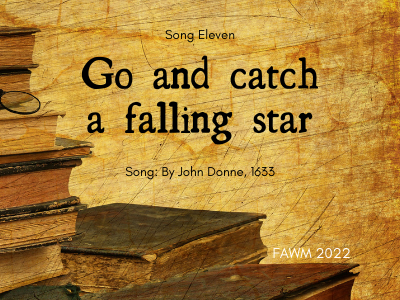By John Donne, 1633
Go and catch a falling star,
Get with child a mandrake root,
Tell me where all past years are,
Or who cleft the devil’s foot,
Teach me to hear mermaids singing,
Or to keep off envy’s stinging,
And find
What wind
Serves to advance an honest mind.
Song: Go and Catch a Falling Star
lyric by John Donne, 1633
(And * notes the lines I altered or rewrote.)
_ _ _ _ _ _ _ _
Go and catch a falling star,
Get with child a mandrake root,
Tell me where all past years are,
Or who cleft the devil’s foot,
Teach me to hear mermaids singing,
Or to keep off envy’s stinging,
And find
What wind
Serves to advance an honest mind.
If thou be’st born to strange sights,
Things invisible to see,
Ride ten thousand days and nights,
Till age snow white hairs on thee,
Thou, when thou return’st, wilt tell me,
All strange wonders that befell thee,
And swear,
No where
Lives a lover true, and fair.*
If thou find’st one, let me know,
Such a pilgrimage were sweet;
Yet do not, I would not go,
Though at next door we might meet;
Though when you met, it were true*
And it will last when it is new,*
Yet they*
Will play*
False, ere I come, to two, or three.
For this one, I’m returning to my roots: Medieval and Renaissance lyrics formed into new works.
This poem by John Donne ties into the “space” theme I’ve been following with its suggestion to “go and catch a falling star.”
It’s a bit cynical, even for 1633, though also clever. It opens with a set of “impossible” tasks and suggests that the listener could manage them as easily as they could find Donne a faithful lover.
I made some lyric changes to this piece because I wanted to shift the “male gaze” and let it be about any lover (opposed to women specifically.)
